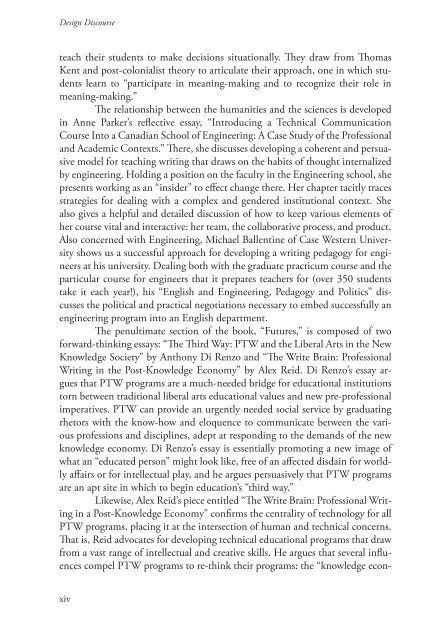Design Discourse- Composing and Revising Programs in Professional and Technical Writing, 2010a
Design Discourse- Composing and Revising Programs in Professional and Technical Writing, 2010a
Design Discourse- Composing and Revising Programs in Professional and Technical Writing, 2010a
Create successful ePaper yourself
Turn your PDF publications into a flip-book with our unique Google optimized e-Paper software.
<strong>Design</strong> <strong>Discourse</strong><br />
teach their students to make decisions situationally. They draw from Thomas<br />
Kent <strong>and</strong> post-colonialist theory to articulate their approach, one <strong>in</strong> which students<br />
learn to “participate <strong>in</strong> mean<strong>in</strong>g-mak<strong>in</strong>g <strong>and</strong> to recognize their role <strong>in</strong><br />
mean<strong>in</strong>g-mak<strong>in</strong>g.”<br />
The relationship between the humanities <strong>and</strong> the sciences is developed<br />
<strong>in</strong> Anne Parker’s reflective essay, “Introduc<strong>in</strong>g a <strong>Technical</strong> Communication<br />
Course Into a Canadian School of Eng<strong>in</strong>eer<strong>in</strong>g: A Case Study of the <strong>Professional</strong><br />
<strong>and</strong> Academic Contexts.” There, she discusses develop<strong>in</strong>g a coherent <strong>and</strong> persuasive<br />
model for teach<strong>in</strong>g writ<strong>in</strong>g that draws on the habits of thought <strong>in</strong>ternalized<br />
by eng<strong>in</strong>eer<strong>in</strong>g. Hold<strong>in</strong>g a position on the faculty <strong>in</strong> the Eng<strong>in</strong>eer<strong>in</strong>g school, she<br />
presents work<strong>in</strong>g as an “<strong>in</strong>sider” to effect change there. Her chapter tacitly traces<br />
strategies for deal<strong>in</strong>g with a complex <strong>and</strong> gendered <strong>in</strong>stitutional context. She<br />
also gives a helpful <strong>and</strong> detailed discussion of how to keep various elements of<br />
her course vital <strong>and</strong> <strong>in</strong>teractive: her team, the collaborative process, <strong>and</strong> product.<br />
Also concerned with Eng<strong>in</strong>eer<strong>in</strong>g, Michael Ballent<strong>in</strong>e of Case Western University<br />
shows us a successful approach for develop<strong>in</strong>g a writ<strong>in</strong>g pedagogy for eng<strong>in</strong>eers<br />
at his university. Deal<strong>in</strong>g both with the graduate practicum course <strong>and</strong> the<br />
particular course for eng<strong>in</strong>eers that it prepares teachers for (over 350 students<br />
take it each year!), his “English <strong>and</strong> Eng<strong>in</strong>eer<strong>in</strong>g, Pedagogy <strong>and</strong> Politics” discusses<br />
the political <strong>and</strong> practical negotiations necessary to embed successfully an<br />
eng<strong>in</strong>eer<strong>in</strong>g program <strong>in</strong>to an English department.<br />
The penultimate section of the book, “Futures,” is composed of two<br />
forward-th<strong>in</strong>k<strong>in</strong>g essays: “The Third Way: PTW <strong>and</strong> the Liberal Arts <strong>in</strong> the New<br />
Knowledge Society” by Anthony Di Renzo <strong>and</strong> “The Write Bra<strong>in</strong>: <strong>Professional</strong><br />
Writ<strong>in</strong>g <strong>in</strong> the Post-Knowledge Economy” by Alex Reid. Di Renzo’s essay argues<br />
that PTW programs are a much-needed bridge for educational <strong>in</strong>stitutions<br />
torn between traditional liberal arts educational values <strong>and</strong> new pre-professional<br />
imperatives. PTW can provide an urgently needed social service by graduat<strong>in</strong>g<br />
rhetors with the know-how <strong>and</strong> eloquence to communicate between the various<br />
professions <strong>and</strong> discipl<strong>in</strong>es, adept at respond<strong>in</strong>g to the dem<strong>and</strong>s of the new<br />
knowledge economy. Di Renzo’s essay is essentially promot<strong>in</strong>g a new image of<br />
what an “educated person” might look like, free of an affected disda<strong>in</strong> for worldly<br />
affairs or for <strong>in</strong>tellectual play, <strong>and</strong> he argues persuasively that PTW programs<br />
are an apt site <strong>in</strong> which to beg<strong>in</strong> education’s “third way.”<br />
Likewise, Alex Reid’s piece entitled “The Write Bra<strong>in</strong>: <strong>Professional</strong> Writ<strong>in</strong>g<br />
<strong>in</strong> a Post-Knowledge Economy” confirms the centrality of technology for all<br />
PTW programs, plac<strong>in</strong>g it at the <strong>in</strong>tersection of human <strong>and</strong> technical concerns.<br />
That is, Reid advocates for develop<strong>in</strong>g technical educational programs that draw<br />
from a vast range of <strong>in</strong>tellectual <strong>and</strong> creative skills. He argues that several <strong>in</strong>fluences<br />
compel PTW programs to re-th<strong>in</strong>k their programs: the “knowledge econ-<br />
xiv


















